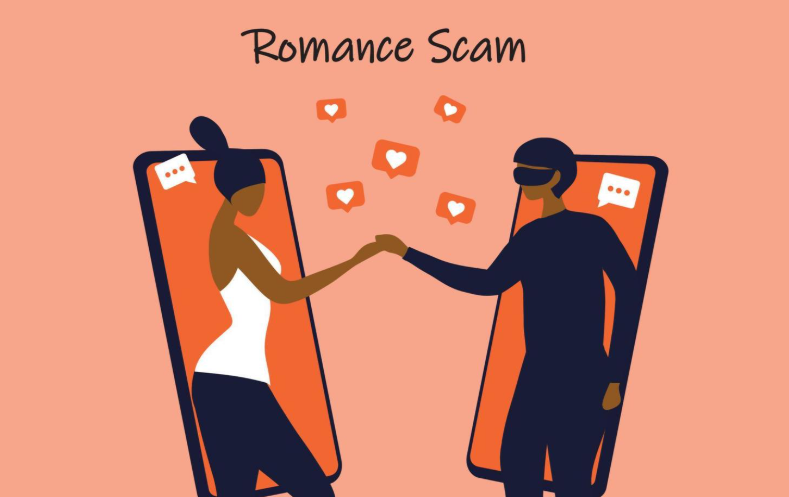Love scammers feign strong feelings to quickly get your money. Read here how to recognize this scam in time and what your loved ones can do.
The term “scamming” refers to fraud in which criminals attempt to quickly obtain money by misrepresenting the identity of the person. This includes phishing, fraud in the housing market, and even love scams on dating portals.
What are love scams?
A love scam (also known as a romance scam) is an online romance scam, often referred to as a modern-day marriage scam. The perpetrators contact their victims via dating apps or social media platforms such as Facebook and Instagram and pretend to be interested in an affair or romantic relationship. The scammers often belong to professional cybercrime rings. They have a good grasp of the proper etiquette and are usually disguised by fake identities. Over an extended period of time, the perpetrators build a basis of trust with their victims and arrange an initial meeting. This is then canceled under the pretext of an emergency on the part of the scammers. They often invent stories about a robbery or a family tragedy and urgently request money from their victims, usually via bank transfer using so-called money transfer services. Further emergency situations follow in order to obtain further payments from the victims. Those affected are easily manipulated due to their high level of emotional dependence and are thus quickly deprived of very large sums of money.
Common types of love scams:
- Military Love Scams:
In these “military love scams,” criminals pretend to be soldiers and use this pretext to avoid meeting their victims in person. They often use alleged military-related expenses as a cover to demand large sums of money. - Love Bombing:
In “love bombing,” the scamming victim is quickly inundated with messages, attention, and declarations of love after initial contact. This gives the victim the impression that they are very important to the other person, quickly develops feelings, and becomes attached to the person. Later, the perpetrators, of course, demand money or other favors. - Catfishing:
In this common online scam, victims are targeted by criminals who pretend to be someone else or even create a fictitious person. The scammers take care to make the fictitious persona as attractive as possible to their target, both physically, emotionally, and intellectually.
From Nigeria scam to love scam
Advance fee fraud, also known as the “Nigeria scam” or “419 scam,” is a well-known criminal business model on the internet. As early as the mid-1990s, emails were sent promising recipients commissions for helping African businessmen move large sums of money out of the country. The methods of the “Nigeria Connection” are constantly changing, but the patterns remain similar.
In love scams, contact with victims is usually established via social media or dating platforms. The contact is carefully established, escalates, and culminates in a supposed romantic relationship or even a seemingly marriage. At some point, the perpetrators request a large sum of money from the victim. The reason often given is the application for a visa or travel expenses. The criminals send fake passports to their victims as supposed proof. The perpetrators also do not shy away from feigning emergencies, illnesses, or deaths in the family in order to quickly obtain the money. In this way, they exploit the victims’ compassion and willingness to help. The money transfer obviously cannot be traced.
Notice
Dating apps offer a low-threshold way to meet new people, make new acquaintances, or even find your dream partner. Read the article ” Dating Apps: Tips for Safe Use and Risks ” to learn what you need to know to use online dating services safely.
Depending on the criminals’ strategy, smaller amounts of money may also be demanded, but on a regular basis or for a variety of purposes. For example, as a donation for the reconstruction of a local church or as a fee for official documents. However, unexpected events usually occur after payment, resulting in further costs and thus demands from the victims. In this way, victims are extracted over an extended period of time, payments that can total much more than the victims would have initially been willing to pay.
According to the experience of the German representation in Nigeria, the following descriptions are frequently used:
- High visa fees or other costs as well as expensive medical examinations before the supposed trip
- Alleged imprisonment that can only be ended by transferring a large sum of money
- Urgent and expensive operations
- Passport documents allegedly retained as a deposit in the hotel, which will only be released after the hotel bill has been paid
- Promised commissions for investment projects or construction projects that do not exist
How do I recognize love scams?
There are a few characteristics that help identify love scams on social media. The approach is always very polite and usually in English – sometimes the messages are even translated into the victim’s language. The person’s pictures are very appealing and professional, giving a serious impression. The profiles are not verified. The perpetrators usually have very interesting or emotional life stories and talk about misfortunes or personal losses. They are successful in their careers, often as doctors or entrepreneurs. They express their interest quickly after making contact. They pay many compliments and quickly confess their love. They try to make it clear to the victim that distance, language, skin color, or origin are irrelevant in order to win them over at all costs. Contact is maintained exclusively online or by phone – and new excuses are always found for this.
How do I protect myself from love scams?
The first step to checking whether a scam is a romance scam is to use a Google image search . This can quickly determine where else a photo has been used – often this is where you can also find the person’s real name. If the photos appear in different dating profiles with different names and life stories, this is a sure sign of fraud. If you suspect this, you should immediately break off contact and report the profile to the relevant platform. Avoid making any payments. Furthermore, you should never share personal information, such as photos or videos, with the criminals. It is also advisable to inform relatives and friends and file a police report.
Tips for relatives of those affected
For outsiders, the deception can initially be distressing, as it is clearly evident, yet the victim remains unconvinced. Those affected often remain trapped in their illusion. It is therefore advisable not to pressure them, but rather to offer a listening ear and support. If there are indications of romance fraud, these can be brought to the attention of the victim calmly and respectfully. Victims often need several attempts and solid evidence to recognize the deception – patience and understanding are especially important here.

is an American author, blogger, and cybersecurity specialist based in Florida. He developed an interest in writing during his school years, which later led him to create content aimed at raising awareness about various forms of online scams, particularly in the world of online dating.
On his platform, Scam Service Report, Hall shares analytical articles and practical advice to help users recognize and avoid traps set by scammers on dating websites. He describes common scam scenarios in detail—such as quick declarations of love, urgent requests for money transfers, refusal to engage in video chats, and attempts to move conversations off the dating platform.



